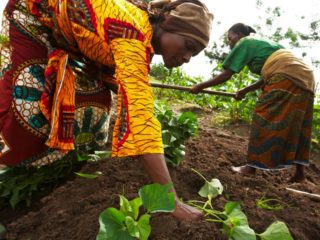Ijewere speaks on how to bring down food prices
Mr. Emmanuel Ijewere, Chairman, Best Foods Group is one of
Nigeria’s most eminent businessmen with extensive experience and interests
across the banking, finance and agricultural spectrums.
His national assignments have
included chairmanships of the Agriculture and Food Security Commission and the
Modified Value Added Tax Committee. He was a member of
Agricultural Transformation Implementation Council (ATIC) under past President
Goodluck Ebele Jonathan's chairmanship. He served as resource person on
agriculture to the Buhari Transition Committee.
He is currently the National co-ordinator of Nigeria Agribusiness Group (NAGB), the umbrella body for Agriculture in Nigeria.
Mr. Ijewere, in this short interview speaks on how the prices of food items in the market can come down. He advocates the active participation of local governments in the agriculture sector in order to build trust and confidence between farmers and primary buyers of farm produce.
 |
| Mr. Emmanuel Ijewere |
A lot of the factors that are
responsible for the rise in food prices revolve around logistics. The logistics
I am referring to can be categorized as either mild or severe. The severe ones
relate to the way crops are harvested and stored by farmers in this country
while the mild logistics refer to the cost of transportation from remote farms
to collection centres.
These two represent a substantial
portion of the final price paid by the consumer. In fact, the farmer does not
benefit from the high prices of foodstuffs in the market. What needs to be done
is for the government to introduce palliative measures and this can only be
done at the local government level. Local governments in the country need to
show interest in the farmers within their areas.
The problems facing farmers are
so complex that they are better addressed at the local government level. Even
the state governments are handicapped because they do not know the farmers as
well as the local government officials. So if we can begin to see pro-active
local government officials that can relate to farmers in a positive way then
those little problems can be resolved.
People also talk about the big
ones – macro-economic challenges – like bad roads and I do not argue that they
are there. But before we get to the stage of transportation, a lot of
inefficiencies exist in the system at the micro level. These are my
observations from working closely with farmers. Many of the farmers need
training but they do not have training
The losses that arise as a result
of inefficiencies in harvesting and storage are far more severe than losses
suffered during movement of the goods.
Government is paying serious attention
to these challenges and it is a welcome development but farmers also have a
role to play in bringing down the prices of foodstuffs in our markets. The farmers
are scattered all over but they need to come together in clusters or groups
within their respective geographical areas based on the crops they cultivate.
This is why I am advocating the
involvement of the local government. Many of the farmers are not educated. They
are not sophisticated and lack access to better ways of doing things. But if
they can come together under a local government product by product, it becomes
easier to create an efficient and sustainable way of having uptakers who will
then link up with the farmers.
There are a lot of people who
want to buy the goods but they cannot afford to visit 200 farmers separately in
order to buy the quantity they need. The farmers are far apart and they are not
organized. The local governments are in the best position to fill the gap. The uptakers
will have more confidence in the local government with which they can sign
agreements.
There is a lot of distrust
between farmers and various buyers in this country but with the intervention of
local governments, prices and other logistics can be easily agreed and food
prices will come down in the market.



Comments
Post a Comment